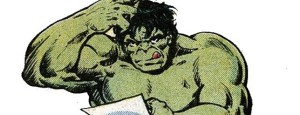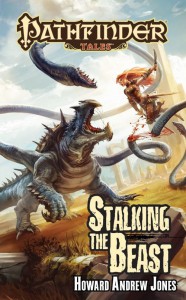Novel Lessons 4.5: Between the Novels Part 1
 After I took my last post about novel writing live I realized that I’d left a few things out.
After I took my last post about novel writing live I realized that I’d left a few things out.
I’ve written before on the importance of reading outside the genre. I’d been doing so, narrowly, for years, because I had never been a solely “sword-and-sorcery” or even “fantasy” reader. After all, I started with science fiction, and pretty soon I was readily interested in reading historical fiction, at least of the swashbuckling sort. But these genres, or at least the flavors I usually prefer, are closely related.
 The first westerns I read, outside of Lonesome Dove, were by Ben Haas (writing as John Benteen). If you want to know what I loved about them and why you should read them, check out my earlier posts (most prominently here, and here). What I saw as a fantasy writer that I immediately began to apply were wonderful details about how a scout uses the wilderness — not just tracking, although that kind of information was a godsend, but how the landscape looks and how people use that landscape and are aware of it if they’re hunting for someone, or being hunted. And then there are the fantastic bits about bow use and archery, and working with horses.
The first westerns I read, outside of Lonesome Dove, were by Ben Haas (writing as John Benteen). If you want to know what I loved about them and why you should read them, check out my earlier posts (most prominently here, and here). What I saw as a fantasy writer that I immediately began to apply were wonderful details about how a scout uses the wilderness — not just tracking, although that kind of information was a godsend, but how the landscape looks and how people use that landscape and are aware of it if they’re hunting for someone, or being hunted. And then there are the fantastic bits about bow use and archery, and working with horses.
After just a few of Haas’ books I began to realize that most fantasy writers were just making this stuff up, and that Haas was portraying these details as they really were, or, perhaps as they really were in the best or most exciting conditions.
I studied not only Haas’ gifts with pacing, and his clear, crisp prose, but all the aforementioned subjects and more. I was eager to soak them up and emulate them, and you can begin to see that influence in Stalking the Beast. I think Elyana is much more aware of the environment and how to use it than my characters ever were before. And there are occasional flashes of her rapport with horses as well, although given that much of the journey is in deep woods, I didn’t get to apply much of my gathered wisdom on that topic.
 As an aside, I should mention that I actually own horses. Now that’s wonderful for seeing how they behave, and getting comfortable around them, and if I ever wanted to write a novel about mucking stalls and brushing horses I could totally kick ass on those descriptive passages. But caring for horses in a modern setting is worlds apart from riding one into battle or shooting a bow from the back of one.
As an aside, I should mention that I actually own horses. Now that’s wonderful for seeing how they behave, and getting comfortable around them, and if I ever wanted to write a novel about mucking stalls and brushing horses I could totally kick ass on those descriptive passages. But caring for horses in a modern setting is worlds apart from riding one into battle or shooting a bow from the back of one.
Next week I’ll talk about the lessons I learned from working 4-6 months on a novel that’s yet to be complete, and then I’ll get back to discussing the ones that have been published.
2 Comments